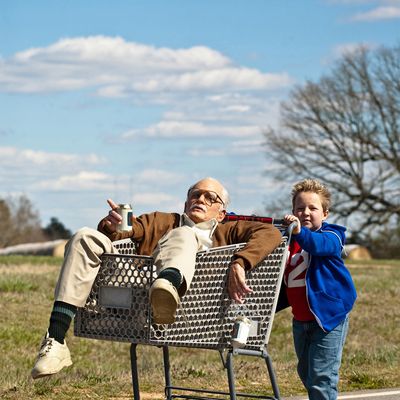
Theorists and historians who study the early days of cinema like to talk about “the cinema of attractions” — movies that didn’t try to tell stories or reproduce reality but rather relayed exhibitionist spectacle through images that inspired everything from awe to lust to disbelief. You can carry the idea across film history and use it to explain the appeal of everything from Golden Age musicals to 2001: A Space Odyssey. And, of course, the Jackass canon. Director Jeff Tremaine, producer Spike Jonze, and star Johnny Knoxville’s ball-busting stunt extravaganzas, in both their MTV and cinematic iterations, are the very definition of non-narrative spectacle. Consider the stripped-down, prehistoric simplicity of the standard Jackass gag: Knoxville (or Steve-O, or whichever other accomplice) announces the name of the stunt to the camera, then goes and does something horrifically dangerous and/or gross and/or stupid, much to our delight. (Sometimes, part of the fun is in the very names of the stunts themselves: Public Boner, the Alligator Tightrope, the Poo Cocktail Supreme, etc.)
So the idea of Bad Grandpa, a road movie in which Knoxville puts on old-age makeup and proceeds to pratfall and shart his way through an unsuspecting America, accompanied by a young boy pretending to be his abandoned grandson, feels, at first glance, somewhat pointless. Narrative padding merely dilutes the Jackass experience. Besides, hasn’t the Borat approach pretty much run its course by this point? Aren’t we tired of watching ordinary folks be made to look like gawking, double-taking fools while highly-paid international celebrities in disguise have one over on them?
The experience of watching Bad Grandpa, however, is a decidedly more complex one than you might imagine. Yes, there are some Jackass-worthy stunts here: At one point, Irving Zisman (the name of Knoxville’s 86-year-old alter-ego) gets repeatedly flattened by a folding bed gone haywire, while bystanders look on in horror; elsewhere, he gets his dick stuck in a soda machine and begs befuddled spectators for mercy. But the film also makes some cursory attempts to play its story straight, giving us scripted scenes between Irving and his grandson Billy (Jackson Nicoll) — just like, you know, a real movie.
But we suspend our disbelief during regular narrative movies; we don’t suspend it when we watch a Jackass movie, because we’re ostensibly watching real stunts performed without the context of fiction or special effects. As a result, watching Bad Grandpa is sometimes akin to being forced to sit through narrative interstitials in order to get to viral YouTube videos. You find yourself constantly adjusting and readjusting your stance vis-à-vis the fourth wall. It’s all a stunt, and you know it’s a stunt, so having to sit there while the “story” develops gets boring at times.
Borat also walked this fine line, of course, but that movie, alongside its outrageous set pieces, also carried a political charge: Sacha Baron Cohen’s shtick was all about revealing the hypocrisies and bigotries of his real-life foils, the gun nuts and neo-Confederates and violent dimwits who populated his fallen American landscape. Ironically, however, the Borat example opens up a fascinating window on Bad Grandpa’s attitude toward its own marks. Because unlike Baron Cohen, Knoxville & Co. go out and find a world that’s largely populated by decent, honest people: The onlookers here do express bewilderment, but it’s mixed often with concern (as when Irv poops on a wall in a restaurant, or when he makes Billy guzzle beer in public), or with joy (as when he crashes a ladies’ night at a strip club and wreaks havoc with a pair of tighty whities and a hilariously low-hanging ball sack). They even tolerate him when he rolls up, drunk, inside a shopping cart at a drive-thru window and starts asking for poontang. By and large, our nation’s unsuspecting bystanders come off pretty well in this movie. For all the fecal matter flying around, and all the dick jokes, Bad Grandpa turns out to be an act of redemption: It’s the anti-Borat. And for all its flaws, it might just be the most heartwarming movie of the year.


